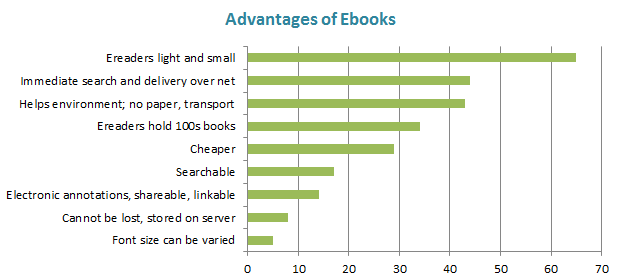Back in October 2009 I posted some simple stats I had collected about how students support the use of ebooks. When marking my recent mid-semester exam for a new core subject, Knowledge Society, with 162 students I was able to collect more data. The students were asked if they favoured the use of ebooks or not, and asked to give reasons for their choice. As before the students are drawn from all faculties in my university.
The results for August 2009 (N=372) and June 2010 (N=162) are:

The gap between students for and against is widening as might be expected as ebooks become more widely available and the number of different ereader devices grows. These results are probably biased somewhat because the main resource for this new subject is a CD-ROM consisting of individual chapters drawn from a number of different textbooks using the Cengage TextChoice service. We will move to a totally online solution for our January 2011 semester where students will be able to access and search the chapters via the web.
On this occasion I collected the reasons students put forward for their choice. I massaged reasons that occurred several times into categories for ease of display. Each advantage put forward is assumed to have the converse disadvantage for the other type of book. First the advantages of ebooks:
The the advantages of printed books:
The arguments for and against are well known and the above bar charts are only of interest in the relative frequencies at which the arguments are put forward. Some of the reasons put forward in favour of printed books such as threats to authors rights, reading affect on eyes, familiar feel of pages, putting publishing staff out of work, show a distinct lack of knowledge of modern ereaders.
Probably the only reason that was missed by all in favour of printed books was that they can be easily loaned and/or sold to others. Also it appeared many students assumed they would be expected to read ebooks on their laptops, netbooks and mobile phones where they can be constantly interrupted with emails, social media and other alerts. This is a significant benefit of Kindle-like dedicated devices, the ability to be cut off when reading.
I look forward in anticipation to the numbers from next year’s question.





